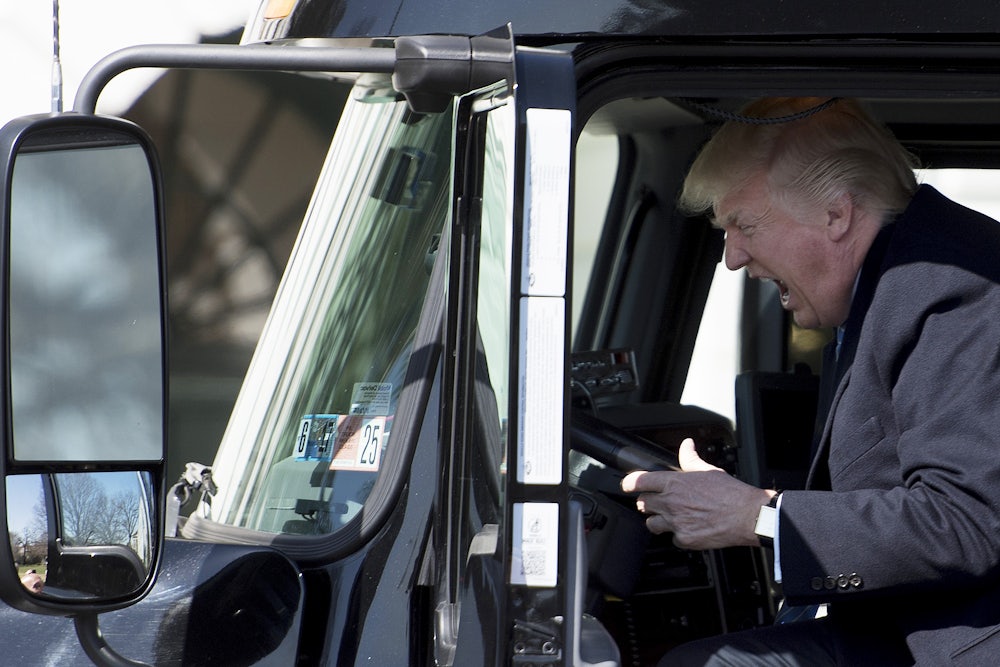If Americans increasingly derive their senses of identity from partisan politics, and research suggests they do, it’s reasonable to infer that more and more public acts will be colored by politics over time. This thesis may explain the strange spectacle from July 2014, in which the Environmental Protection Agency felt compelled to comment on an online video craze featuring drivers who’d modified their vehicles to make them visibly more polluting.
The practice is “rolling coal,” so called because it involves rigging diesel engines to bypass pollution controls for the purposes of emitting ostentatious clouds of soot, and per an EPA spokeswoman, it is “illegal.”
It is also extremely stupid. Like “truck nuts,” but more toxic, antisocial, and costly. There is no punchline to the joke, beyond imagining environmentalists getting mad. Coal rollers pay hundreds, if not thousands of dollars a pop for the sole purpose of harassing people who think cars should be cleaner.
At the time, the online rolling coal trend—like many Obama-era protest trends—struck critics and observers as a kind of obnoxious primal scream, indulged by an increasingly powerless subset of the population. What was less obvious was that the impulse behind rolling coal, if not rolling coal per se, had become the intellectual bedrock of conservatism as practiced in America. It is now the key animating ethos in the decision-making process of America’s ruling political party.
The question of whether a policy or personnel choice would piss off liberals has become a disturbingly reliable indicator of what President Donald Trump is likely to do and how Republicans in Congress are likely to defend it.
Trump’s decision to withdraw from the Paris climate agreement—and the way he made it—reflects the rolling-coal mindset of his administration perfectly.
As ridiculous as this is, it is almost certainly true. https://t.co/yrFfJsdJ9a
— Dan Pfeiffer (@danpfeiffer) June 3, 2017
According to The Washington Post, “One senior White House official characterized disappointing European allies as ‘a secondary benefit’ of Trump’s decision.” The fact that French President Emanuel Macron has talked up the importance of outmanning Trump with aggressive handshakes reportedly helped firm up Trump’s inclination to pull out of the accord.
But Paris is only the most recent and consequential example of this tendency to refract key decisions through the lens of who would be most annoyed. The faltering efforts to repeal and replace Obamacare are animated more by lust for revenge than by policy need. The Affordable Care Act could be easily stabilized with marginal changes to law. Historically, updating popular laws with technical corrections and modernizations has been one of the most routine and mundane tasks of government.
The GOP’s determination to replace the ACA with a radioactively unpopular alternative is one indication that a different kind of politics has taken hold of the party. The fact that most Republicans don’t even like the American Health Care Act is another. But most telling of all is that before Barack Obama set out to fix the individual insurance market, literally no one had proposed or would have considered proposing Trumpcare as a desirable set of reforms. Republicans simply stapled together whatever set of measures they needed to pass a bill in the House, because the claim to having dismantled something important to Obama and liberals matters more to them than the underlying state of the U.S. health care system.
It is true that liberals dislike Republican policies in general, whether the policies were devised in good faith, for above-board ideological reasons, or not. But there is something novel about the fact that the governing party in America is building its agenda extemporaneously, with all the civic mindedness of a juvenile delinquent in a souped-up truck.
